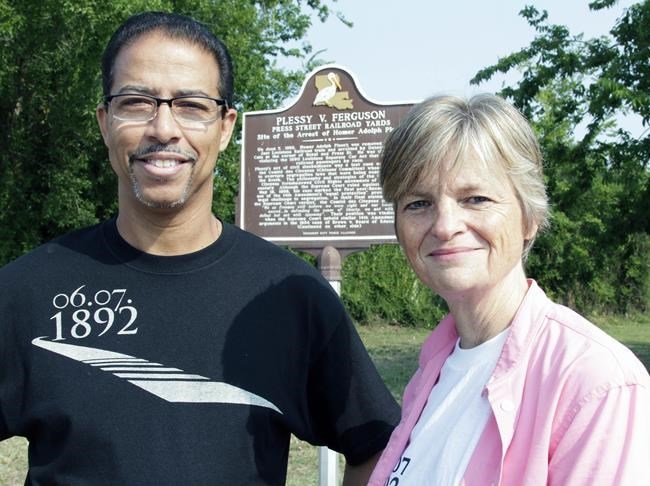NEW ORLEANS (AP) — A Louisiana board has posthumously pardoned Homer Plessy, the namesake of the U.S. Supreme Court’s 1896 “separate but equal” ruling affirming state segregation laws. The state Board of Pardon issued its decision on Friday, clearing the Creole man’s record of a conviction for refusing to leave a whites-only train car in New Orleans. The decision now goes to Gov. John Bel Edwards, who has final say over the pardon. Plessy was arrested in 1892 and pleaded guilty to violating the Separate Car Act after the Supreme Court’s ruling. He died in 1925 with the conviction on his record.
THIS IS A BREAKING NEWS UPDATE. AP’s earlier story follows below.
NEW ORLEANS (AP) — Homer Plessy, the namesake of the U.S. Supreme Court’s 1896 notorious “separate but equal” ruling, is being considered for a posthumous pardon.
Plessy, a Creole man of color who was arrested in New Orleans for refusing to leave a whites-only train car in 1892, is on the Friday docket of the Louisiana Board of Pardons, which will weigh whether to clear Plessy’s name. The act would ultimately need to be approved by Gov. John Bel Edwards.
Plessy boarded the train as part of a civil rights group’s efforts to challenge a state law that mandated segregated seating. He pleaded guilty before trial judge John Howard Ferguson to violating the Separate Car Act, and was fined $25.
The Supreme Court ruled in Plessy v. Ferguson that state racial segregation laws didn’t violate the Constitution as long as the facilities for the races were of equal quality. Plessy died in 1925 with the conviction still on his record.
More than a century after Plessy appeared before Ferguson, their descendants became friends, forming a nonprofit that advocates for civil rights education and urging the parole board to issue the pardon.
Other recent efforts have acknowledged Plessy’s role in history, including a 2018 vote by the New Orleans City Council to rename a section of the street where he tried to board the train in his honor.
The Associated Press


